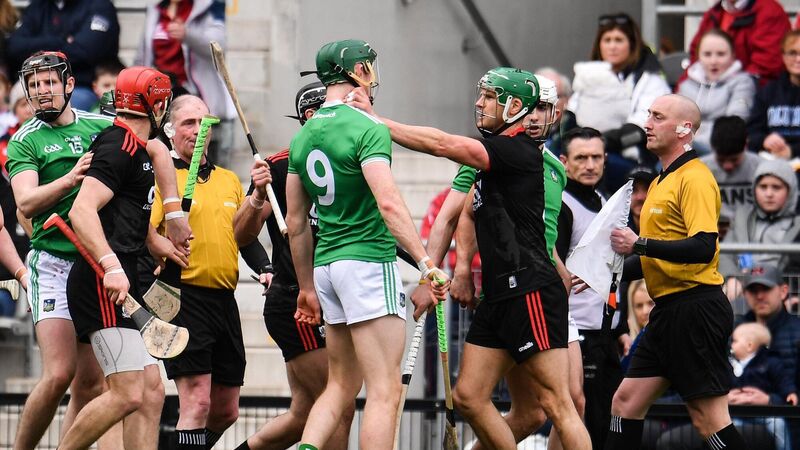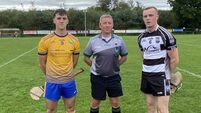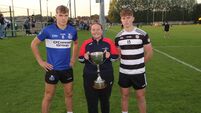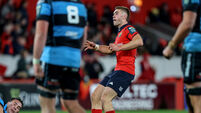Erring on the side of caution in a fast game is most logical way to ref hurling

THROUGHOUT the week, everyone has been lining up to have a go at hurling referees, particularly since the performances of Johnny Murphy and Sean Cleere for the Dublin-Wexford and Cork-Limerick matches last weekend.
On Monday morning, former Limerick manager TJ Ryan had his say on the Irish Examiner podcast after watching Cleere award 42 frees in Pairc Ui Chaoimh.
“Most of the counties now have video analysis on the referee,” said Ryan.
“What’s the referee doing to up his game? Is he doing video analysis on players, on what they do, on the tackles and handpasses?
"The analysis by teams, I don’t see the same coming back from referees. They are not in touch with the modern game.”

On OTBAM on Tuesday morning, former Dublin and Tipperary hurler Ryan O’Dwyer got some stuff off his chest after watching Murphy dole out 13 yellow cards and three reds.
"As a spectacle, this is ruining the game," said O’Dwyer. “If I was to bring someone who has never seen a game of hurling before, I would have kind of been embarrassed to bring them to that game.”
On Wednesday morning, former Tipperary manager Michael ‘Babs’ Keating said Murphy’s refereeing was “the worst I’ve ever seen”.
Dublin-Wexford was a narky, edgy match. Murphy blew for 50 frees but he still failed to assert his authority on the match.
His application of the advantage rule was poor and a couple of bad calls turned the heat up higher on Murphy’s performance.
Because of hurling’s increased pace and physicality, the game is becoming harder to referee.
Modern players are conditioned to take the ball into contact rather than hit it long and risk giving away possession, so there is always more potential for more bodies and more claustrophobia in tighter spaces.
And the referee is always bound to be challenged in those repeated scenarios throughout a match.
It’s harder again for referees to get those calls right when there is so much swarm tackling in hurling now, and such an emphasis on forcing turnovers.
The player in possession, especially in the middle third, is increasingly liable to be surrounded by a gang of tacklers.
The referee has to then decide – if he can see through the mass of bodies – if the player is being fouled, or has over-carried the ball.
Unless its blatantly obvious, whatever decision the referee makes most of the time, one of the parties won’t agree with it.
In an article in the Sunday Times last August, Denis Walsh outlined how the referees 80-page handbook, which they are issued with each year, contains one page devoted to 29 offences which are categorized as “aggressive fouls”.
The appropriate response is also listed alongside the offence but there still isn’t any specific reference to the swarm tackle, although there are a handful of potential infringements for that area of combat.
Willie Barrett, the national head of the referee’s body, said in that article that these fouls are being “picked up quite a lot,”.
Yet Barrett also accepted that there is a policing deficiency.
Another huge issue is the rapid pace of the game. No matter how fit a referee is, he will struggle to keep up with the play in an inter-county hurling match.
Referees have been getting fitter but they have had to.
In order to referee in the National League a minimum level of 16.8 must be reached in the Bangsbo intermittent recovery test while a score of at least 17.4 is required for any referee of a championship match. The average level recorded for an adult club player ranges between 17.1 and 19.1.
A number of referees failed the fitness test in January, while more will get a second chance in an upcoming retest, which will also frame the refereeing panel for the championship.
Hurling has lost some good referees because they can’t reach those fitness levels.
And with Brian Gavin and Barry Kelly now retired, and James McGrath having walked away infuriated after failing to get the 2018 All-Ireland final, the pool of top-class inter-county referees at the moment is shallower than it has been in a long time.
Referees never have it easy. The experience of David Gough last year, when his appointment for the drawn All-Ireland football final became a matter of public wrangling, further underlined the scrutiny referees are under now from every angle, especially social media.
The pressure is further ramped up with referees being assessed from every level by their own body.
It’s harder again for referees to get those calls right when there is such confusion around the tackle.
The basic principle of most players now in a one-on-one tackling situation is to delay the player in possession so that the cavalry will soon arrive to hunt that player down.
It’s even more important again when hurling – similar to football - is governed so much by turnovers.
Refs have to be strict arbiters of the rules. To be any other way is a licence for players to commit anarchy.
‘Using common sense’ is a term repeatedly used by the hurling community when discussing what good refereeing is, or what it should be.
That should never be an amnesty for letting cynical play go. But in a game which is becoming harder and harder to referee, erring on the side of caution in such a fast-paced game is often the most logical way to officiate.
And for the referee to get players and supporters to row in behind him too.







 App?
App?







